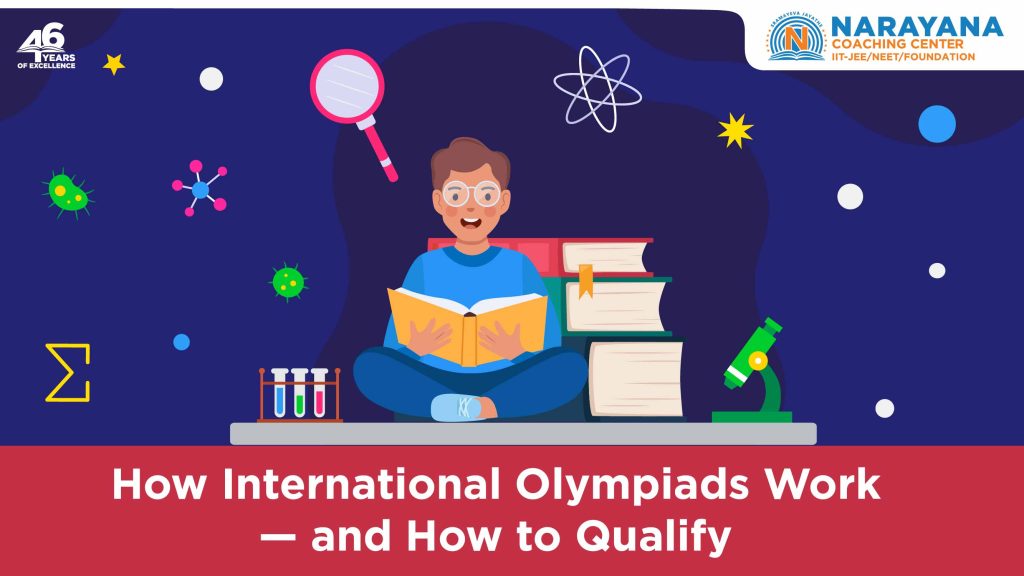
International Olympiads are prestigious academic competitions conducted for school students across the globe. They test students’ proficiency in subjects such as mathematics, science, computer science, and linguistics. For students in grades 6 to 10, participating in these Olympiads can open doors to higher learning, scholarships, and global recognition.
This blog outlines the structure of International Olympiads, the different stages involved, eligibility criteria, preparation tips, and how you can qualify as a student.
What Are International Olympiads?
International Olympiads are high-level academic competitions that bring together the brightest young minds from around the world. These contests are held annually and hosted by different countries on a rotational basis. Examples include:
- International Mathematical Olympiad (IMO)
- International Physics Olympiad (IPhO)
- International Chemistry Olympiad (IChO)
- International Olympiad in Informatics (IOI)
- International Biology Olympiad (IBO)
Subjects Covered in International Olympiads
Students can compete in various subjects depending on their interests and strengths:
- Mathematics: Logic, algebra, geometry, number theory
- Physics: Mechanics, optics, thermodynamics, electromagnetism
- Chemistry: Organic, inorganic, and physical chemistry
- Biology: Genetics, physiology, ecology
- Informatics/Computer Science: Algorithms, programming
- Astronomy & Linguistics (usually for higher grades)
Who Can Participate?
While International Olympiads are generally meant for high school students, the journey often starts earlier. Students from classes 6 to 10 can begin their preparation through national-level Olympiads organised by recognised bodies.
Eligibility:
- Must be enrolled in a recognised school (usually under 20 years of age)
- Should qualify through national Olympiad programmes
- Must possess a strong interest in and foundational knowledge of the subject
Key Stages of the Olympiad Journey
The path to the international stage involves multiple rounds:
1. School-Level Olympiads:
These are basic competitions held to identify and shortlist students for the next stage. Schools may conduct internal tests or enrol students through private Olympiad organisations.
2. National Olympiad Examinations:
In India, organisations like HBCSE and SOF conduct these exams. Examples:
- PRMO (Pre-Regional Mathematical Olympiad)
- NSEJS (National Standard Examination in Junior Science)
3. Training Camps:
Top performers are invited to orientation or training camps organised by national bodies. These camps offer intensive coaching, advanced problem-solving techniques, and practice tests.
4. National Team Selection:
Based on performance in the camps, students are selected to represent their country at the international level.
5. International Olympiad:
Selected students compete with others from around the world, showcasing their knowledge, subject expertise, and problem-solving skills on a global platform.
Important Indian Organisations Conducting Olympiads
- Homi Bhabha Centre for Science Education (HBCSE) – Oversees science and mathematics Olympiads in India
- Science Olympiad Foundation (SOF) – Offers beginner-level Olympiads like IMO, NSO, and NCO
- Unified Council – Conducts the NSTSE, UIMO, and UIEO
- Indian Computing Olympiad (ICO) – Focuses on computer science and informatics
How to Prepare for Olympiads
1. Start Early
Begin from class 6 or 7 to develop a strong foundation in your subject of interest.
2. Understand the Syllabus
Refer to national Olympiad syllabi and previous years’ question papers. Topics may go beyond your regular school curriculum.
3. Practise Regularly
Solve sample questions, mock tests, and previous Olympiad papers. Focus on both accuracy and speed.
4. Use Quality Study Material
Books by authors like R.D. Sharma (mathematics), H.C. Verma (physics), and Olympiad-specific guides can be extremely helpful.
5. Join Coaching or Online Platforms
Several online platforms offer dedicated Olympiad coaching for classes 6–10.
Benefits of Participating in Olympiads
- Boosts analytical and logical thinking
- Improves problem-solving skills
- Enhances academic profile
- Creates opportunities for scholarships and admission to elite institutions
- Provides exposure to international peers and subject experts
Tips to Qualify for International Olympiads
- Be consistent with your preparation
- Take mock tests regularly
- Build conceptual clarity, not just rote learning
- Learn time management strategies
- Participate in group study sessions and academic discussions
Common Challenges Faced
- Balancing schoolwork with Olympiad preparation
- Lack of awareness about correct resources
- Underestimating the syllabus depth
- Inadequate practice of multi-step problems
Overcoming Challenges
- Create a well-structured and balanced study plan
- Seek guidance from mentors or previous participants
- Use online discussion forums and Olympiad communities
Real-Life Olympiad Success Stories
Many Indian students have made the nation proud at International Olympiads. For example, in recent years, India has secured top ranks in the IMO and the IPhO through persistent efforts and well-designed national training programmes.
Conclusion
International Olympiads offer a thrilling and enriching journey for students passionate about academics. Starting early, staying consistent, and leveraging the right resources can help students from grades 6 to 10 not just qualify but also excel on the global stage.
FAQs
- Can a student in class 6 appear for International Olympiads?
Not directly, but students in class 6 can start preparing through school-level and national Olympiads. - Are Olympiads only for science and maths?
No, Olympiads are also conducted in informatics, astronomy, linguistics, and more. - Do schools help in Olympiad preparation?
Some schools provide support, but most preparation is self-driven or undertaken through coaching programmes. - What is the cost involved in Olympiad participation?
Registration fees are nominal, though coaching and travel costs may vary. - What are the best books for Olympiad preparation?
Books published by Arihant, MTG, and authors like H.C. Verma and R.D. Sharma are excellent resources.
